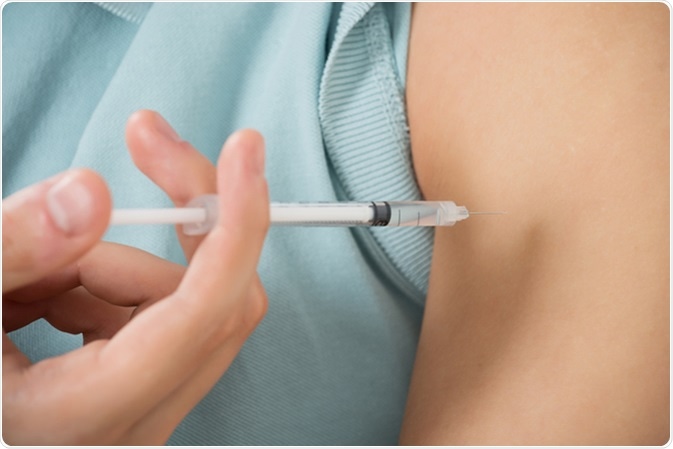Diabetes is a metabolic disorder, which is characterized by the inability of the body to produce or use insulin properly. As a consequence, the level of glucose/sugar in the blood increases, leading to serious health issues including vision loss, kidney failure, heart attack, and stroke.

Image Credit: Andrey_Popov/ Shutterstock
According to the World Health Organization, about 422 million people are affected by diabetes worldwide, and it is predicted to be the seventh leading cause of death by 2030. However, the onset or consequences of diabetes can be prevented or at least delayed by controlling body weight, ensuring regular physical activity, having a healthy diet without excessive carbohydrate intake, not smoking, and routine blood sugar monitoring.
Once it develops, complications may be prevented or mitigated by medical treatment in addition to the above measures.
First Aid and Sudden Illness: Diabetic Emergency
Diabetic Emergencies
An acute or abrupt increase or drop in the insulin level is often the trigger for an emergency situation in a patient with diabetes, and this can be life-threatening if not controlled immediately. Too high a level of insulin causes a significant lowering of the blood glucose level, a condition termed hypoglycemia, which may rapidly result in insulin shock. In contrast, an extremely low level of insulin causes a sharp increase in the blood sugar level, a condition termed hyperglycemia, which may ultimately lead to a diabetic coma.
Clinical Features of Various Diabetic Emergencies
To effectively control the situations arising from diabetic emergencies, it is important to understand the signs and symptoms associated with too high or too low blood glucose levels.
The general consequences of Hypoglycemia include:
- Weakness and lethargy
- Rapid heart rate
- Hyperventilation
- Confusion and irrational behavior
- Extreme hunger
- Lack of sensation in the hands or feet
- Odorless breath
- Headache
- Trembling
- Pale and sweaty skin
The general consequences of hyperglycemia include:
- Feeble and rapid heart rate
- Nausea
- Warm and dry skin
- Confusion
- Unsteady movement
- Sweet fruity breath
- Extreme thirst
- Abnormal breathing
- Drowsiness, followed by loss of consciousness
Diabetic Ketoacidosis
This is another serious complication in which the patient has very high blood glucose levels but not enough insulin to use the sugar for energy, resulting in the breakdown of lipids in the body and resulting accumulation of ketoacids from fat molecule metabolism.
The general consequences of diabetic ketoacidosis include:
- Vomiting
- Dehydration
- Labored breathing called Kussmaul breathing with gasping respiration
- A fruity odor caused by ketones in the expired air, similar to nail polish
- Rapid heartbeat
- Incoherence and disorientation in advanced cases
In such a situation emergency medical help should be availed of to prevent death.
In all these conditions, the immediate care depends primarily on the state of consciousness and the vital parameters, such as body temperature, heart rate, breathing rate, and blood pressure. Depending on the severity of situation, measures to be considered include:
- If the person is unconscious or unresponsive, he or she should be treated under medical supervision on an emergency basis.
- If the unconscious person shows any signs of slipping into a life-threatening state, chest compression should be performed till medical help arrives.
- If the person is conscious and alert, administration of sugar or sugary substances like fruit juice or fizzy drinks is recommended.
- After providing a sugar dose, the vital parameters of the person should be monitored constantly to identify any worsening of the situation. An improvement usually occurs within a few minutes if the symptoms are due to hypoglycemia.
- If the situation does not improve and the person becomes confused, immediate medical assistance is mandatory.
- Under any circumstance, insulin or other medications should not be administered without medical supervision should be strictly avoided.
- Wearing a diabetic emergency ID card is also highly recommended for diabetic patients, especially those on anti-diabetic medications, as these can alert bystanders or medical professionals about the situation in case of emergency.
Further Reading
Last Updated: May 17, 2023